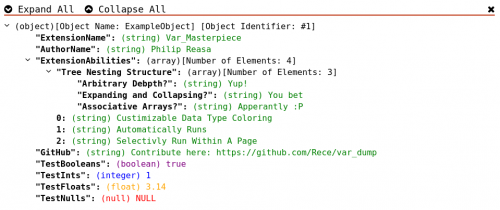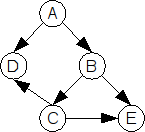
Var Masterpiece is a Google Chrome add-on, which formats PHP var_dump() output into something much more beautiful and useful. You can customize the type colors and a few other things in the extension options, once installed.

Var Masterpiece is a Google Chrome add-on, which formats PHP var_dump() output into something much more beautiful and useful. You can customize the type colors and a few other things in the extension options, once installed.
Simon Holywell shows how to quickly create the stdClass in PHP and populate it with properties and values, by casting an array to an object:
$x = (object) [
'a' => 'test',
'b' => 'test2',
'c' => 'test3'
];
var_dump($x);
/*
object(stdClass)#1 (3) {
["a"]=>
string(4) "test"
["b"]=>
string(5) "test2"
["c"]=>
string(5) "test3"
}
*/
A couple of things to keep in mind here are:
Very handy!
One of the projects I am working on at work presented an interesting problem. I had a list of items with dependencies on one another and I needed to figure out the order in which to use those items, based on their dependencies.
For the sake of the example, think of a list of database tables, which reference each other. I need a way to export those tables in such a way, that when imported back in, tables that have dependencies will be imported after all those tables on which they depend. (It’s not the real task I’m working on, but close enough.)
Consider the following list as an example of input data:
// List of items with dependencies. Order is not important
$tables = [
'articles_meta' => ['articles'],
'articles' => ['users', 'categories', 'tags'],
'categories' => [],
'comments' => ['users', 'articles'],
'options' => [],
'tags' => [],
'users' => [],
'users_meta' => ['users'],
];
The result of the dependency resolution should give me the list like this (there are variations in order, of course, as long as the dependencies are satisfied):
categories options tags users users_meta articles articles_meta comments
There are several ways to solve this problem. My first attempt took about 50 lines of code and worked fine, but it lacked elegance. It had too many nested loops and tricky conditions and was difficult to read. My second attempt was slightly better, with a bit of a recursion, but still looked somewhat off. It felt like there is a better way to do it, and that I’ve done something similar before, but I could put my finger on it.
I thought I’d take a look at something that solves a similar problem. Composer, PHP package and dependency manager, surely had something to offer. A brief check of the GitHub repository, and that idea is out of my hand. Composer deals with much more complex issues, so its Dependency Resolver code is not something I can grasp in a few minutes.
It was time for some Googling. Moments later, my deja vu feeling of “I’ve seen this before” was easily explained. This problem fits into the graph theory, which I probably used last back in my college years. Of course, I could have grabbed the book off the shelf and refresh my knowledge, practicing the sacred art of the Real Programming. But time was an issue, so I cheated.
I found this “Dependency resolving algorithm” blog post by Ferry Boender over at Electric Monk (thanks man!). He had exactly what I needed – simple and straight forward recursive algorithm for walking the graph, circular dependency detection, and even some performance optimization.

The only problem was that his code is all in Python. But that’s not really a problem. So I’ve rewritten his code in PHP and got exactly what I needed. Here it is:
// List of items with dependencies. Order is not important
$tables = [
'articles_meta' => ['articles'],
'articles' => ['users', 'categories', 'tags'],
'categories' => [],
'comments' => ['users', 'articles'],
'options' => [],
'tags' => [],
'users' => [],
'users_meta' => ['users'],
];
$resolved = [];
$unresolved = [];
// Resolve dependencies for each table
foreach (array_keys($tables) as $table) {
try {
list ($resolved, $unresolved) = dep_resolve($table, $tables, $resolved, $unresolved);
} catch (\Exception $e) {
die("Oops! " . $e->getMessage());
}
}
// Print out result
foreach ($resolved as $table) {
$deps = empty($tables[$table]) ? 'none' : join(',', $tables[$table]);
print "$table (deps: $deps)\n";
}
/**
* Recursive dependency resolution
*
* @param string $item Item to resolve dependencies for
* @param array $items List of all items with dependencies
* @param array $resolved List of resolved items
* @param array $unresolved List of unresolved items
* @return array
*/
function dep_resolve($item, array $items, array $resolved, array $unresolved) {
array_push($unresolved, $item);
foreach ($items[$item] as $dep) {
if (!in_array($dep, $resolved)) {
if (!in_array($dep, $unresolved)) {
array_push($unresolved, $dep);
list($resolved, $unresolved) = dep_resolve($dep, $items, $resolved, $unresolved);
} else {
throw new \RuntimeException("Circular dependency: $item -> $dep");
}
}
}
// Add $item to $resolved if it's not already there
if (!in_array($item, $resolved)) {
array_push($resolved, $item);
}
// Remove all occurrences of $item in $unresolved
while (($index = array_search($item, $unresolved)) !== false) {
unset($unresolved[$index]);
}
return [$resolved, $unresolved];
}
Running the above code produces the following result:
$ php dependecy.php users (deps: none) categories (deps: none) tags (deps: none) articles (deps: users,categories,tags) articles_meta (deps: articles) comments (deps: users,articles) options (deps: none) users_meta (deps: users)
Which is exactly what I was looking for. And now that I have it here, I’ll probably be needing it again and again. It’s an elegant hammer to a lot of my nails.

Levi Hackwith has an excellent post explaining “How to Read and Improve the C.R.A.P Index of your code“:
The C.R.A.P. (Change Risk Analysis and Predictions) index is designed to analyze and predict the amount of effort, pain, and time required to maintain an existing body of code.
It iterates over the old bits of wisdom – write simpler code and cover it with unit tests – but it does so in a very simple and measurable way.
He also reminds us that:
…software metrics, in general, are just tools. No single metric can tell the whole story; it’s just one more data point. Metrics are meant to be used by developers, not the other way around – the metric should work for you, you should not have to work for the metric. Metrics should never be an end unto themselves. Metrics are meant to help you think, not to do the thinking for you. ~Alberto Savoia

There is a whole lot of ways to build and deploy web applications these days. I’ve done my own circle of trials and errors and have some very strong opinions on which ones are good, which ones are bad, and which ones are ugly.
My most recent discovery was Robo – a modern task runner for PHP. I’ve been pushing it to one of those weekends, where I have nothing better to do, to trying it out. And today I did. Not just tried it out, but replaced a part of our infrastructure, which was previously running on Laravel Envoy.
Robo is very nice. On one hand, it’s simple and straight forward and is very easy to get you started with. On the other hand, it provides quite a bit of functionality to help you with the build and deploy process. Here are some of the things that I love about it:
Things I don’t like (remember I have been using Robo for just about 3 minutes):
Overall, it looks like a very nice and elegant system and I’ll probably be using it for much more. Once I get a bit more comfortable with it, I will probably replace our phake-builder setup with Robo.
If you are looking for a good tool to use for your build and deploy needs, give it a try. You’ll probably like it a lot.